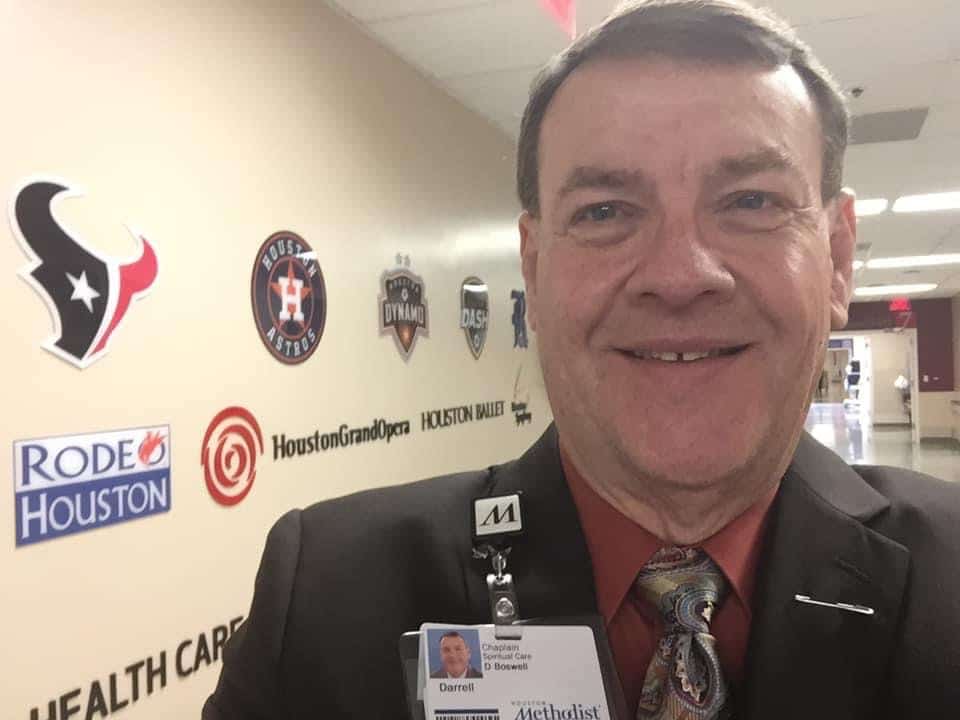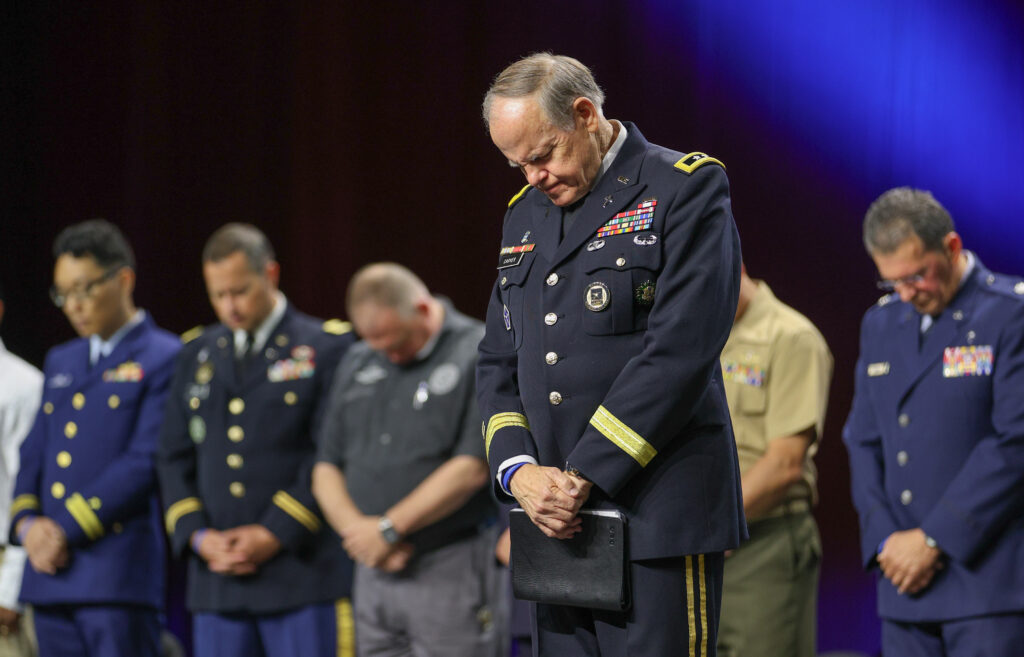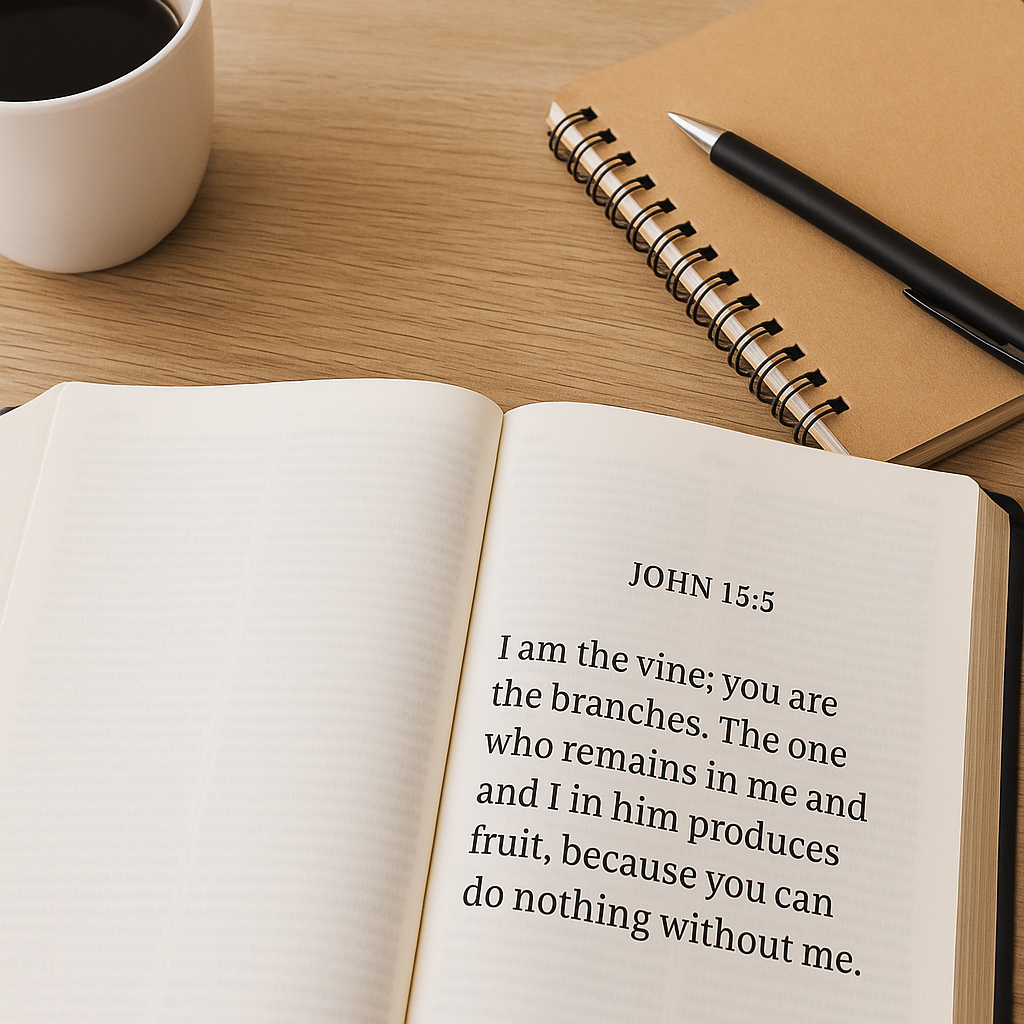Darrell Boswell is one of our Southern Baptist chaplains, serving at Houston Methodist Hospital in Houston, Texas, and his stories of how the challenges of COVID-19 have actually given him a new outlook on his ministry as a hospital chaplain.
North American Mission Board: How did you become an endorsed SBC chaplain?
Darrell Boswell: I’ve honestly always believed that God called me into this ministry. I had pastored for 22 years before becoming a chaplain five years ago, and I’ve just always believed God called me to do what I’m doing at this stage of my life. I really feel it’s a mission field in so many ways. My chaplaincy journey began while I was working at a large church in Dallas, Texas. One of the pastors who’d been there 45 years or so (he was my mentor), said, “Darrell, you need to go through Clinical Pastoral Education (CPE). He said it would enable me to be a much better pastor one-on-one with people. I actually signed up and realized two weeks before the class began that it was a Spanish-speaking class, and I don’t speak Spanish. So, I ended up helping start a church instead.
Dozens of years later, I was down in the Houston area pastoring a small church, and my mentor said again, “You need to go through CPE.” So, I went through CPE at Houston Methodist Hospital as an intern, residency and worked part time as an on-call chaplain.
What it did was force me to do some introspection internally. I realized I’d been beat up and hurt through 22 years of ministry. I was able to address those hurts, and instead of it just making me a better chaplain, CPE made me a better person. And it opened the door for an exchange I had with a patient during a patient visit where I was able to minister to that person in a way I couldn’t in a church setting. And that’s when I knew that this was where God wanted me.
NAMB: In five years, I’m sure you’ve amassed a great deal of stories. What’s one that sticks out to you?
DB: One of the things I remember fondly is an 88-year old woman I went to visit, and of course, I had all of my PPE protective gear on because of COVID. I talked to her for a while, and led her to receive the Lord Jesus Christ as her Savior. And I found out she acknowledged that baptism was very important. Well, as a Baptist, we’re, of course, accustomed to baptizing by immersion. But in the hospital, there was no place to immerse her. So, I was like, “God, how can I do this?”
I ended up getting a face towel, and I wet the face towel and I took the towel and pulled it over her forehead and her whole face, and pulled it back over her head, and it represented the old life being buried and her being raised to new life in Christ. And as soon as I took that towel off her face, she began to weep uncontrollably. I asked her what was wrong, and she said, “I’m so happy. I feel God’s peace in a way I’ve never felt it before.” I’ve been able to do that two or three other times since, but I’ll never forget that first time.
NAMB: How do stories and special encounters like that help you stay encouraged in the tough times?
DB: I think these stories represent the reason why I love chaplaincy so much. It’s because every visit is different. You never know if there’s something that you say that will trigger a thought that will really allow a person to open up to you. I work in a cardiac care unit, and one of the four units I cover is a cardio ICU. In that setting, there are people waiting for transplants. They know that if they don’t get one, they’ll likely die, so I’m walking into a setting where some of these people know they’ve got to face their own mortality. Conversations can just be remarkable. It changes you. I visit over 300 patients per month, and each one has the potential to be a life changing conversation, both for them and for me.
NAMB: How has COVID-19 changed your scope of ministry?
DB: Initially we didn’t really understand or know much about the coronavirus, and there was a lot of fear associated with that. Our hospital was fortunate that they viewed us as critical frontline workers. So, they worked diligently with us to make sure we knew how to take care of ourselves through hand washing, social distancing, mask wear, and PPE gear. I think one of the biggest things that changed is that we couldn’t touch people. That’s really difficult because we’re so accustomed to appropriately touching people when we pray for them.
We began to see our ministry shift from patients to the hospital staff. We still ministered to patients, but we had to find creative ways to do that. Then it was ministry to families of both the patients and staff. God used those times, though, to open up opportunities for us to share with those families through technology and keep them updated on what was happening with their hospitalized loved ones. It was such a sad thing that many of our folks would bring in loved ones into the emergency room and, at the height of the virus, that was the last time they saw them. So, we were constantly calling the families, giving them updates and, as I said, God really opened doors for great ministry during those times.
NAMB: With so much happening around us, and so much pulling on a chaplain’s emotional bandwidth, how would you advise chaplains to keep their spiritual edge during these times?
DB: To be able to really keep your edge as a chaplain, you have to maintain a good self-care plan, finding time to rest to get away from what you see every day. Every day I see someone die. This is the only job in the world I’ve ever had where I go to my work setting and immediately receive a report on who died the previous day. I start off every day confronted with death and mortality, and with each name I hear, I know there’s a grieving, hurting family left behind. And because that family has lost a loved one, I’m responsible for offering ministry to them. If you don’t take care of yourself, you’ll definitely lose your edge and you won’t be effective in ministry.
Published December 10, 2020




